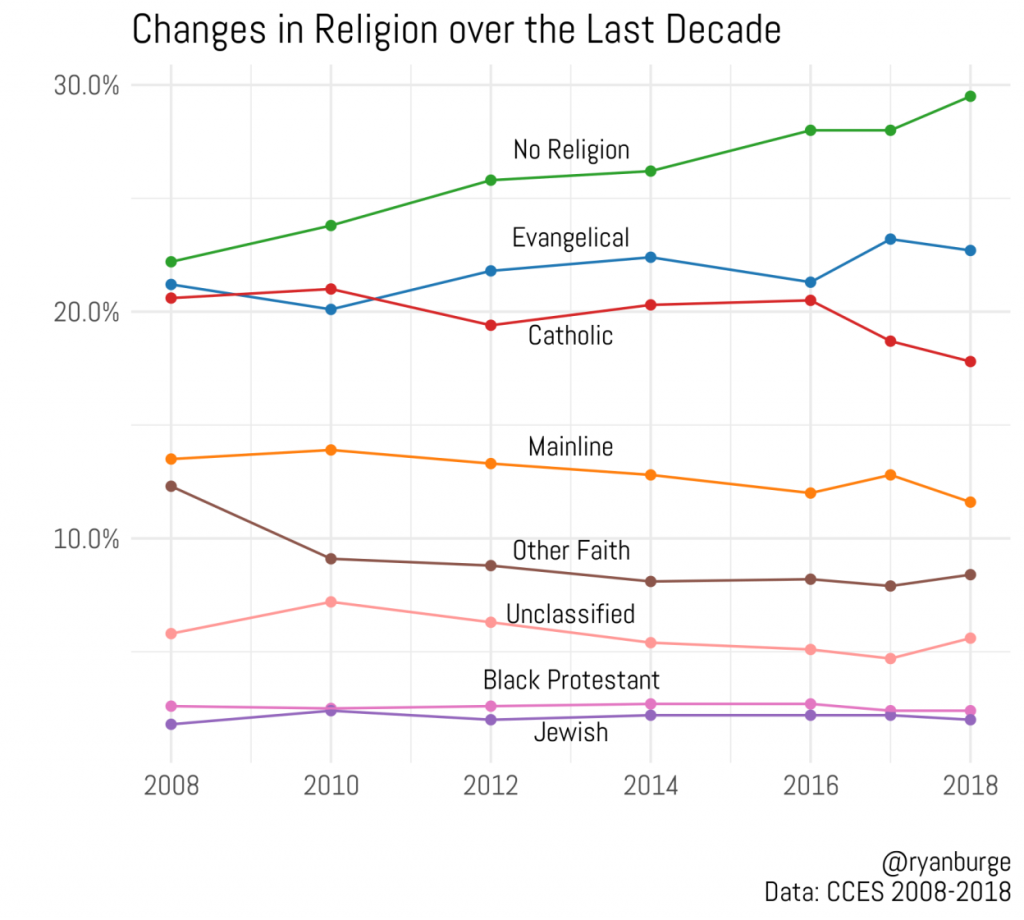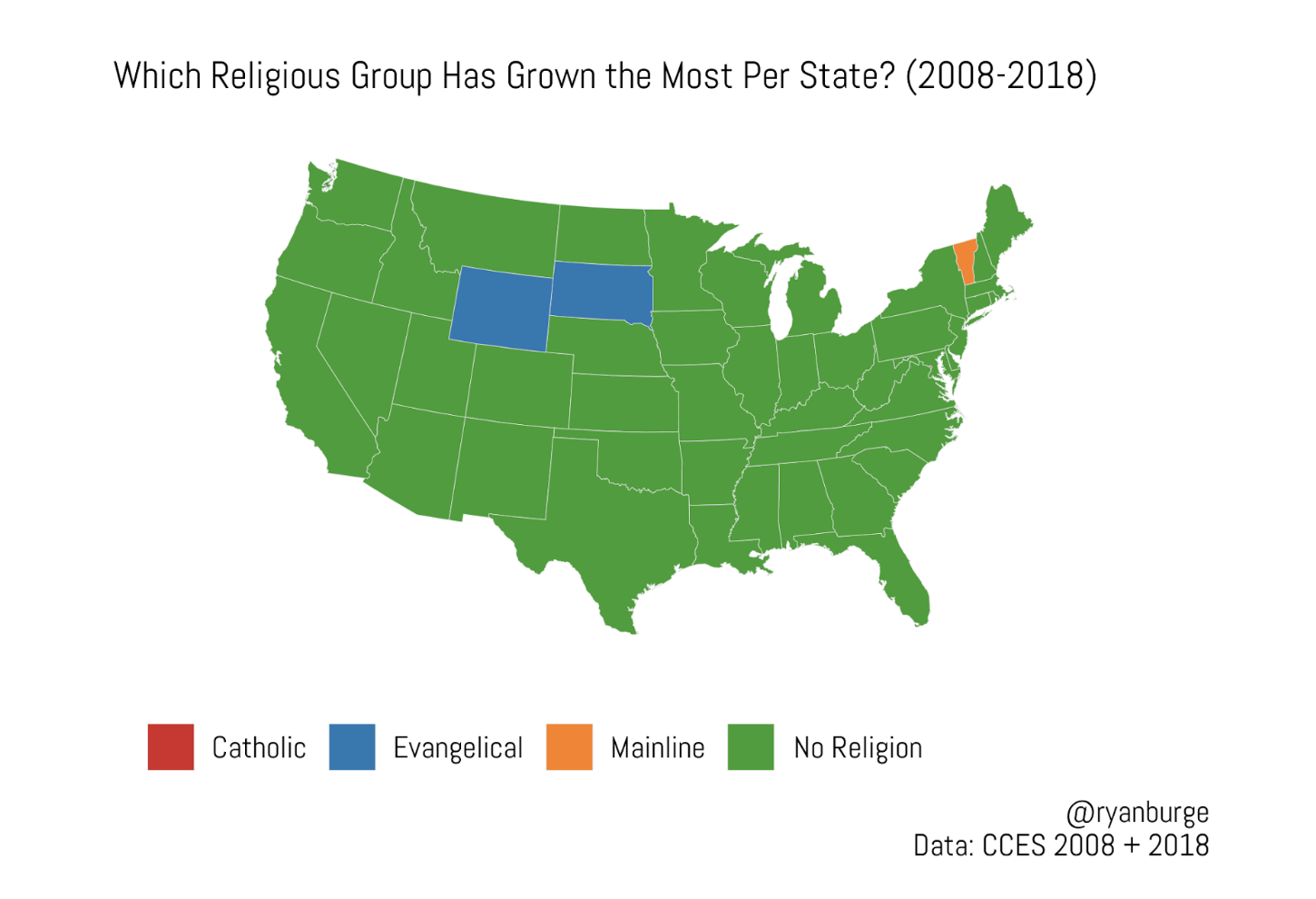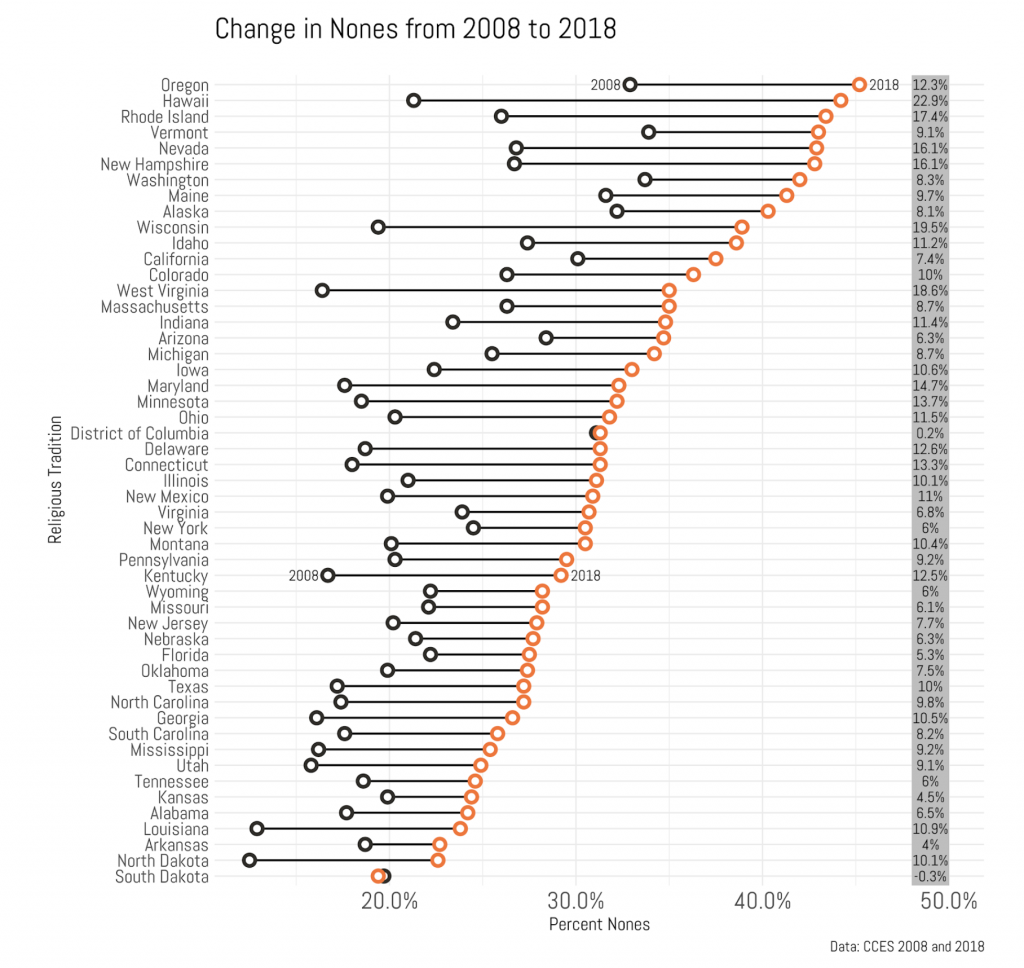Skwim
Veteran Member
.
"For more than a decade now, the Cooperative Congressional Election Study (CCES) has conducted frequent surveys to determine political attitudes and demographic shifts for Americans. There’s always a huge sample size and the data is fantastic. Naturally, Professor Ryan P. Burge of Eastern Illinois University sifted through it to see how religious beliefs have changed over time.
He explained three of those changes in a post, and they’re fascinating for those of us who want to see a nation that’s less dependent on organized religion.
First, he looked at changes in religious affiliation over the past decade. We know the popularity of organized religion has declined over time, but the numbers for most denominations has been relatively stable over the years. There were drops and gains for various groups but it’s not like any group is perpetually heading downhill.
The “No Religion” line, however, seems to go up and up and up…

That’s interesting! That’s also not all that new. Several surveys have shown “Nones” on the rise, if not the largest single “religious” group in the country.
Then Burge looked at what’s happening state by state since the CCES data lets him break it down like that. When it comes to which religious groups have seen the greatest rise within each state between 2008 and 2018, he found that the “Nones” are running the board.

We had the largest growth everywhere except South Dakota, Wyoming, Vermont, Alaska, and Washington, D.C. (the last two aren’t on the map).
I blame the one atheist who left each state and changed all the percentages. (Cue rimshot.)
Impressive!
BUT WAIT! There’s more. If you look for the actual numbers for each state in 2008 and 2018, what you find, nearly across the board, is a huge leap forward for non-religious people. Often in places you wouldn’t expect.
Meaning, in just about every state, the rise of the Nones was massive.

That’s ridiculous growth in places like Hawaii and Wisconsin and West Virginia. We’re talking a major cultural shift over the past decade.
I knew the non-religious had grown in numbers, but to see it happening just about everywhere — and at such high rates — is a testament to how far religion has fallen. And given how many self-inflicted wounds we’re seeing with organized religion these days, with the Catholic Church’s sex scandals, and evangelical megachurch sex scandals, and the Southern Baptist Convention’s sex scandals, and the Church of Jesus Christ of Latter-day Saints’ sex scandals, it’s not like we’ve seen the end of the rise for non-religiosity.
Far from hitting a plateau, the growth will continue for a long time to come."
source
"For more than a decade now, the Cooperative Congressional Election Study (CCES) has conducted frequent surveys to determine political attitudes and demographic shifts for Americans. There’s always a huge sample size and the data is fantastic. Naturally, Professor Ryan P. Burge of Eastern Illinois University sifted through it to see how religious beliefs have changed over time.
He explained three of those changes in a post, and they’re fascinating for those of us who want to see a nation that’s less dependent on organized religion.
First, he looked at changes in religious affiliation over the past decade. We know the popularity of organized religion has declined over time, but the numbers for most denominations has been relatively stable over the years. There were drops and gains for various groups but it’s not like any group is perpetually heading downhill.
The “No Religion” line, however, seems to go up and up and up…

That’s interesting! That’s also not all that new. Several surveys have shown “Nones” on the rise, if not the largest single “religious” group in the country.
Then Burge looked at what’s happening state by state since the CCES data lets him break it down like that. When it comes to which religious groups have seen the greatest rise within each state between 2008 and 2018, he found that the “Nones” are running the board.

We had the largest growth everywhere except South Dakota, Wyoming, Vermont, Alaska, and Washington, D.C. (the last two aren’t on the map).
I blame the one atheist who left each state and changed all the percentages. (Cue rimshot.)
Impressive!
BUT WAIT! There’s more. If you look for the actual numbers for each state in 2008 and 2018, what you find, nearly across the board, is a huge leap forward for non-religious people. Often in places you wouldn’t expect.
Meaning, in just about every state, the rise of the Nones was massive.

[The Nones] grew 22.9% in Hawaii, 19.5% in Wisconsin, 18.6% in West Virginia, and 17.4% in Rhode Island. Not exactly progressive strongholds in the United States. However, overall growth was widespread. In fact, the nones enjoyed double digit gains in 24 states. The only state in which the nones declined was South Dakota (-0.3%). The slowest growth states were Arkansas (4%), Kansas (4.5%), and Florida (5.3%).
I knew the non-religious had grown in numbers, but to see it happening just about everywhere — and at such high rates — is a testament to how far religion has fallen. And given how many self-inflicted wounds we’re seeing with organized religion these days, with the Catholic Church’s sex scandals, and evangelical megachurch sex scandals, and the Southern Baptist Convention’s sex scandals, and the Church of Jesus Christ of Latter-day Saints’ sex scandals, it’s not like we’ve seen the end of the rise for non-religiosity.
Far from hitting a plateau, the growth will continue for a long time to come."
source
So, what does this portend for the USA? Is it a trend that will eventually seriously hurt the Christian religion in America? Will it blow over? Will it eventually stop and change directions?
Where do you see Christianity 25 years down the road.
